George Josiah Palmer (1828-1892) was the founder and editor of Church Times . [1] [2]
Contents

George Josiah Palmer (1828-1892) was the founder and editor of Church Times . [1] [2]

Palmer was born on 30 June 1828 in Clapham, then in Surrey, the eldest son of George Josiah Palmer, a printer of Savoy Street, Strand, London, and his wife, Charlotte, who was the daughter of John Hatchard, founder of Hatchards bookshop in Piccadilly. He was educated at Clapham grammar school and King's College School. After his schooling he joined his father's printing firm as a compositor, later becoming a manager. [3]
On 15 May 1851 he married Marianne Beall, the daughter of an upholsterer from Cheshunt, Hertfordshire. They had six sons and a daughter. [3]
The year after his marriage, Palmer acquired a small bookselling and printing business in Bloomsbury, however after eight unprofitable years he had to sell out and move to smaller premises at 32 Little Queen Street, Lincoln's Inn Fields, later to become the home of the Church Times. Palmer's decision to launch a popular church newspaper came after his experience printing and publishing The Union newspaper, a Christian publication which failed in 1862. The first issue of Palmer's Church Times appeared on 7 February 1863. Like The Union it was founded to promote the work and views of the Tractarians, who were then in opposition to the established church. The paper proved successful, soon outselling its Anglican competitor newspapers, and circulation climbed throughout Palmer's lifetime. [3]
As well as managing and publishing the Church Times, Palmer also edited it until his retirement in 1887. The paper remained in the ownership of the family for over a hundred years until its sale in 1989 and three of his sons worked at the paper. [3]
Palmer died on 27 January 1892 at 3 Victoria Crescent, Ramsgate [3] and was buried on the eastern side of Highgate Cemetery.[ citation needed ]

Samuel Wilberforce, FRS was an English bishop in the Church of England, and the third son of William Wilberforce. Known as "Soapy Sam", Wilberforce was one of the greatest public speakers of his day. He is now best remembered for his opposition to Charles Darwin's theory of evolution at a debate in 1860.

Charles Prestwich Scott, usually cited as C. P. Scott, was a British journalist, publisher and politician. Born in Bath, Somerset, he was the editor of the Manchester Guardian from 1872 until 1929 and its owner from 1907 until his death. He was also a Liberal Member of Parliament and pursued a progressive liberal agenda in the pages of the newspaper.
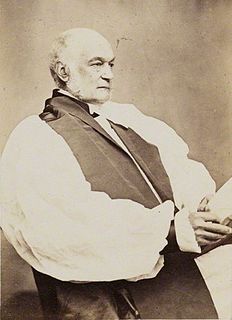
George Moberly was an English cleric who was headmaster of Winchester College, and then served as Bishop of Salisbury from 1869 until his death.
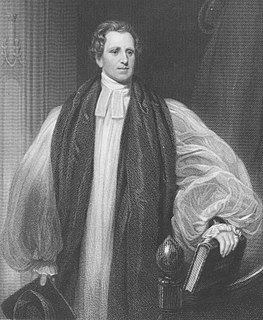
Daniel Wilson was an English Bishop of Calcutta.

The Christian Observer was a London evangelical periodical, serving a readership in the Church of England. It appeared from 1802 to 1874.
Thomas Goodwin Hatchard was an English bishop of Mauritius.
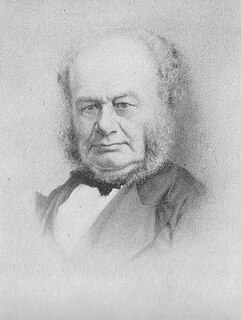
George Philip (1800–1882) was a cartographer, map publisher and founder of the publishing house George Philip & Son Ltd.

Sir John Leng was a newspaper proprietor and Liberal Party politician in Scotland.
Hugh Nicholas Pearson (1776–1856) was an English cleric, Dean of Salisbury from 1823. He was connected with the Clapham Sect.
William Sinclair was a Scottish author and rector of St George's Church, Leeds, and of Pulborough, Sussex.

Benjamin Harrison (1808–1887) was an Anglican clergyman and ecclesiastical administrator. His father was Benjamin Harrison, Treasurer of Guy's Hospital.
Sidney Ernest Dark was an English journalist, author and critic who was editor of the Church Times, among other publications. Dark wrote more than 30 books on subjects ranging from the church to literature and theatre, as well as biographies and novels.
Archibald Prentice (1792–1857) was a Scottish journalist, known as a radical reformer and temperance campaigner.

John Thackray Bunce was a British journalist and author. He served as editor of Aris's Birmingham Gazette from 1860 to 1862, and of the Birmingham Post from 1862 to 1898.
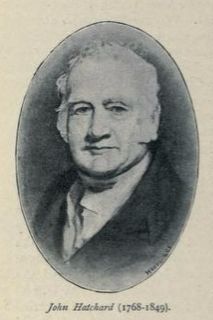
John Hatchard (1769–1849) was an English publisher and bookseller, in Piccadilly, London. The Hatchards bookshop there is still in business.

Gerard Thomas Noel (1782–1851) was a Church of England cleric, known as a hymn writer.
Anne Weldon Bernard was an English aristocrat and philanthropist.
William Lionel Hichens (1874–1940) was a British industrialist, chairman of Cammell Laird from 1910.

Anna Campbell Palmer was an American author and editor. Disliking publicity, she wrote constantly under a great number of nom de plumes, adopting a new one when she began to be identified. Sometimes she had intervals of complete silence, distrustful of her powers and displeased with her efforts. After her marriage, she was known as "Mrs. George Archibald". In 1901, she began to use her full married name, Mrs. George Archibald Palmer, on all her books and articles in periodicals. She wrote a number of poems which appeared in the principal magazines of her day. She was also a successful author of fiction and biography. Palmer served as editor of Young Men's Journal, a YMCA magazine, from 1889 until 1898, at the time being the only woman editor of a young men's journal in the world.
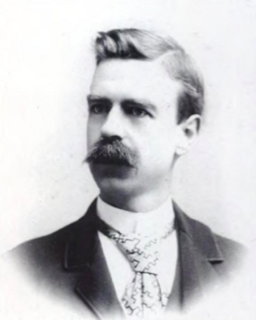
Joseph Nelson Hallock was an American newspaper editor, politician, and banker from New York.